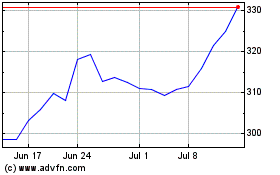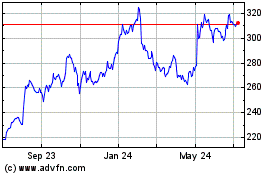AbbVie Sues Amgen Over Humira -- WSJ
August 06 2016 - 3:03AM
Dow Jones News
By Jonathan D. Rockoff
Drugmaker AbbVie Inc. has filed a patent-infringement lawsuit
against rival Amgen Inc., seeking to block sales of a lower-priced
replica of AbbVie's top-selling drug, Humira.
The lawsuit, filed late Thursday in federal court in Delaware,
alleges Amgen's copy of the biotech drug Humira violates many of
AbbVie's patents on the anti-inflammatory treatment. The suit asks
the court to keep the copy off the market if it gains approval by
the Food and Drug Administration.
AbbVie's legal challenge was an expected step under the federal
law that aimed to bring price competition to expensive biotech
drugs by allowing for copies known as biosimilars. The law, the
Biosimilar Price Competition and Innovation Act, established a
mechanism for companies to secure approval of biosimilars without
doing all the testing a new medicine would require.
AbbVie has been taking steps, including filing new patents
protecting Humira, to delay the introduction of copies, and has
told analysts it expects copies to hit the market no earlier than
2022. Humira accounts for about 60% of AbbVie's revenue.
In its lawsuit, AbbVie said the law "does not give Amgen license
to infringe AbbVie's patents." AbbVie also threatened further
patent infringement suits because it claims 61 Humira patents are
being violated, while the current lawsuit focuses on just 10.
Humira is one of the top-selling drugs in the U.S., with $8.4
billion in sales last year. It is also expensive, with a list price
of $53,260 a year.
Biosimilars were authorized as part of the 2009 federal
health-care overhaul to reduce spending on such biotech drugs, much
like generics have cut the costs of pills.
Given Humira's success, several drug companies have been
developing biosimilar versions. Amgen already sells a brand-name
rival, Enbrel.
The FDA hasn't approved Amgen's biosimilar Humira yet, but the
decision is nearing. Last month, a panel of outside experts
recommended approval.
Amgen said Friday it doesn't comment on litigation but that it
is working with the FDA as the agency completes its review of the
company's Humira biosimilar.
The patent-infringement challenge is likely to delay launch of
Amgen's biosimilar, if the copy is approved, until the legal issues
are resolved. Further delays could result if AbbVie decides to file
another infringement lawsuit involving additional patents after an
FDA decision on approving the biosimilar.
A litigation delay followed the approval last year of the first
biosimilar, Novartis AG's Zarxio, which was a replica of an Amgen
cancer-care drug called Neupogen. As a result, Zarxio, which was
approved in March 2015, didn't go on sale until September. Novartis
sold its drug at a 15% discount to the original.
This past week, CVS Health Corp., whose Caremark unit
administers drug benefits for many employers and insurers, took
steps to start steering patients to biosimilars.
Separately, AbbVie said in a securities filing Friday that
Elliott Associates LP and four other investment funds sued in
Illinois state court, alleging the drug company misrepresented its
proposed takeover of Ireland-based Shire PLC and seeking
damages.
In July 2014, AbbVie agreed to buy Shire but walked away from
the $54 billion deal about three months later, citing new rules
from the Treasury Department aimed at deterring so-called
tax-inversion transactions.
In the lawsuit, the plaintiffs said AbbVie played down the
importance of using the deal to lower its corporate tax rate. The
plaintiffs also allege AbbVie didn't disclose that its board had
failed to evaluate whether it would go ahead with the transaction
in the event the government took action.
AbbVie declined to comment.
Write to Jonathan D. Rockoff at Jonathan.Rockoff@wsj.com
(END) Dow Jones Newswires
August 06, 2016 02:48 ET (06:48 GMT)
Copyright (c) 2016 Dow Jones & Company, Inc.
Amgen (NASDAQ:AMGN)
Historical Stock Chart
From Mar 2024 to Apr 2024

Amgen (NASDAQ:AMGN)
Historical Stock Chart
From Apr 2023 to Apr 2024
